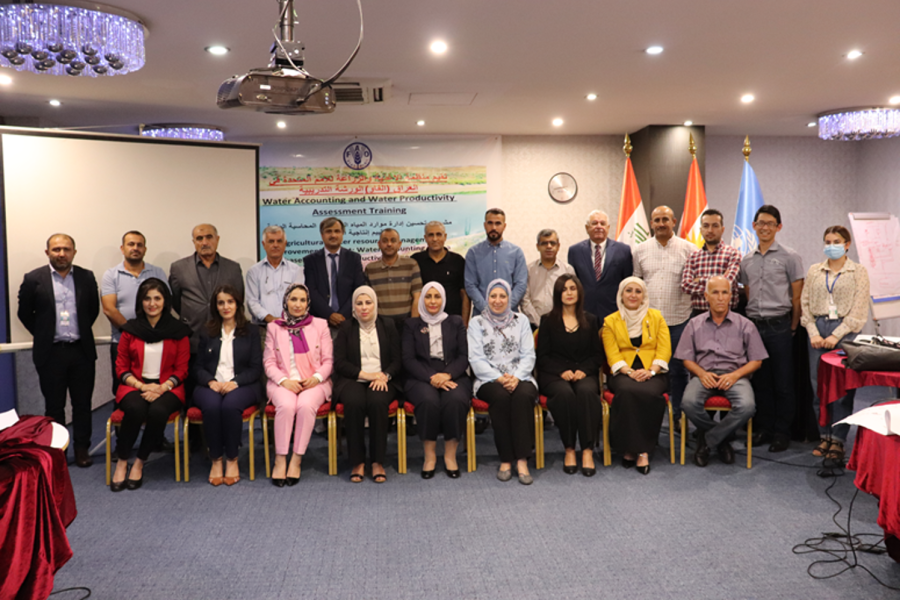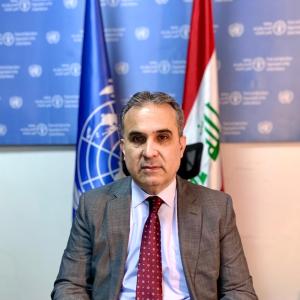Water Accounting and Water Productivity Assessment Training workshop
03 October 2021
Erbil, Iraq 29 September: FAO-Iraq conducted a two-day training workshop in Erbil on Water Accounting and Water Productivity assessment within the implementation of an FAO project aiming at agricultural Water Resource Management Improvement, Water accounting with a baseline water productivity assessment” to demonstrate the value of water accounting (WA) and water productivity (WP) assessment and to build capacity among stakeholders in agriculture and water sectors.

Representatives from Ministry of Water Resources, Ministry of Agriculture, Ministry of Higher Education and Ministry of Agriculture and Water Resources of Kurdistan were participated in the training workshop. In the opening session, FAO Representative in Iraq Dr. Salah El Hajj Hassan has stressed on the importance of the FAO training workshop in improving of water productivity and efficiency, sustainability and improvement of agricultural water resource management. “The timing of the workshop is critical since Iraq has recently experienced sever dry season”. FAO Representative expressed.
He thanked the participants, the stakeholders of agriculture and water resources and he confirmed that FAO commitments to make all possible efforts to support communities, and national authorities to develop feasible and adaptable measure to overcome the impacts of water scarcity, lower rain precipitation, an increase in the frequency and severity of droughts and climatic changes that affect the country.
The training provided presentations on WA definition, important concepts in WA, and analysis methods, followed by hands-on group exercises on various analyses/skills used in WA, such as water budgeting, supply-demand gap analysis, water use fraction analysis, and perceptual model development. The training also introduced different kinds of WP, interpretation of WP data, field data collection approaches, and utilization of FAO’s WaPOR (online data portal). In addition, participants practiced calculation/estimation of yields, different types of WP, and WP gap with example data through a group exercise.
FAO`s experts in Iraq and from the regional office in Cairo participated in the preparation of lectures, training and discussions, whether by attendance or through zoom applications.

He started his career in 1984, as Senior Research Assistant in the Agricultural Research and Education Centre (AREC), American University of Beirut. From 1987 to 1991, he was Coordinator of the Student Training Programme, and also Agriculture and Horticultural Teacher for the Faculty of Agriculture, at the Lebanese University.
From 1991 to 1995, he worked as Agricultural Engineer at the Ministry of Agriculture, Bekaa Regional Office, Zahlah and was then assigned to the Agricultural Research Institute in the Tal Amara station, first as Head of the Crop Production Department and subsequently in charge of the Plant Protection Laboratory. From 2002 to 2006, he was Director of the Kfardane Research Station (Agricultural Research Institute). In 2008, he became Visiting Scientist at the International Maize and Wheat Improvement Centre (CIMMYT) and Coordinator of a project with the International Centre for Atomic Energy Agency, Vienna.
In 2010, he served as Advisor to the Minister for Agriculture of Lebanon. In 2011, he became President of the Pesticide Scientific Committee, Head of the Phytoplasma Committee and Director of the Agriculture and Rural Development Programme (ARDP) (EU-funded project). From 2010 to 2013, he represented Lebanon in negotiations with EU, Egypt, Jordan and Iraq. During his career, Mr Hajj Hassan also carried out a number of other functions. He represented the Lebanese Agricultural Research Institute (LARI) in several research programmes with the International Centre for Agricultural Research in the Dry Areas (ICARDA) and the American University of Beirut. He was Coordinator of the Mashreq/Maghreb project with ICARDA, representing Lebanon in the Steering Committee, as well as being the Head of the Sugar-beet Delivery and of the Wheat Delivery Committees. For a number of years, Mr Hajj Hassan worked for the preparation of FAO TCP projects and served as the National Director of a TCP project. He joined FAO in January 2014 as FAO Representative in Yemen. Mr Hajj Hassan succeeds Mr El Zubi as FAO Representative in Iraq.




